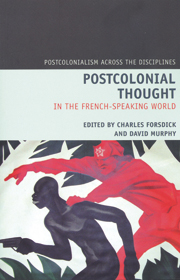Introduction: Situating Francophone Postcolonial Thought
Summary
On 26 July 2007, less than three months after his election to the French presidency and on his first post-election trip to Africa, Nicolas Sarkozy stood before an invited audience of students, scholars, dignitaries and political leaders at the Université Cheikh Anta Diop de Dakar in Senegal, and delivered a speech that was directed at ‘la jeunesse africaine’ [African youth]. The speech was awaited with a mixture of expectation and trepidation, for Sarkozy had adopted a strangely dualistic discourse on France's colonial past and postcolonial relationships during the preceding campaign: on the one hand, he had expressed a desire to break with the corrupt practices of the previous fifty years, frequently dubbed la Françafrique, a netherworld of corrupt oil, arms and trade deals designed to maintain France's global ‘sphere of influence’, a process charted as early as the 1970s in texts such as Mongo Beti's scathing polemic Main basse sur le Cameroun (1972), or Ousmane Sembene's witheringly satirical film, Xala (1974); yet on the other hand, he had emphasized in several pre-election speeches the positive effects of French colonialism and had evoked his desire for a vision of history that French people could celebrate rather than one for which they were obliged to repent (see Liauzu, 2007a).
- Type
- Chapter
- Information
- Postcolonial Thought in the French Speaking World , pp. 1 - 28Publisher: Liverpool University PressPrint publication year: 2009
- 1
- Cited by



